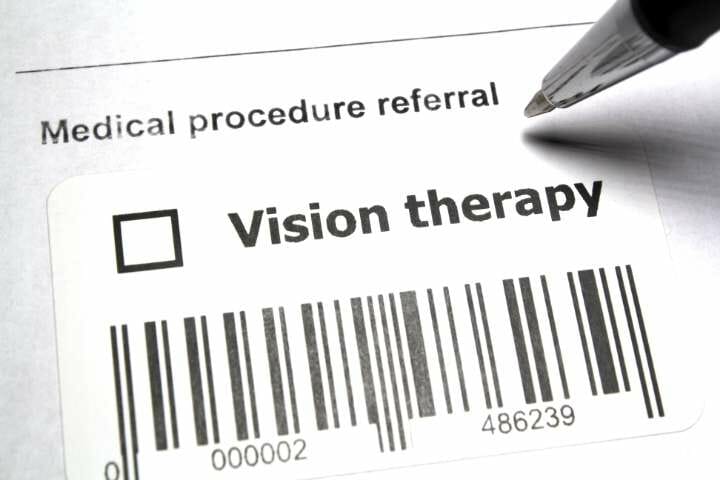If you have insurance coverage for items like glasses or contacts, you may think that it automatically means your insurance will cover vision therapy too.

This isn’t necessarily true, though as vision therapy is not the same as glasses and contact lenses.
What Is Vision Therapy?
Vision therapy, or vision rehabilitation, is often used to treat diagnosed vision disorders and conditions.
For most people with these conditions, vision therapy is really the only option for treatment of the condition, and they will need ongoing therapy to keep it from progressing.
In the simplest terms, vision therapy is like exercises for your eyes. During these sessions, and sometimes at home, patients are encouraged to use the muscles around their eyes to move them in certain directions or patterns to strengthen them.
It has been controversial, in some cases, as not all ophthalmologists recommend or prescribe this treatment for their patients.
There hasn’t been enough supporting evidence that says vision therapy is really beneficial. It’s a relatively new treatment type and some eye doctors may not believe that it’s really the best option for their patients.
Types Of Vision Therapy
There are three types of vision therapy: perceptual vision therapy (also known as behavioral vision therapy), orthoptic vision therapy and prevention vision therapy.

Perceptual Vision Therapy
This type of therapy is used to help the patient develop perception and processing of the visual system. This is one of the types of vision therapy that has little evidence supporting its effectiveness, but it is still offered for patients who need it.
You might like to read: Guide To Managing Vision Problems In Old Age
Prevention Vision Therapy
The main goal of this type of therapy is to reverse, or prevent, problems with people’s vision like myopia. Along with perceptual vision therapy, there is a lot of controversy over whether it actually works and if it should really be used for patients with these medical conditions.
Orthoptic Vision Therapy
This is most often used in children who have troubles with their eye coordination or have underdeveloped visual abilities. Unlike the other types of vision therapy mentioned, this type of therapy has proven results where it has drastically improved the vision of the patients who participate in it.
Does Insurance Cover Vision Therapy?
For most private insurance companies, treatments will be partially covered for people who are insured on the plan.

However, there may be a catch to this. The insurance company may place strict limits on exactly who qualifies for these services and which plans get the coverage. Alternatively, they may only give a small amount of money towards paying for vision therapy services.
In most cases, when coverage is provided, the insurance company will require the insured person to pay for the services upfront and will then be reimbursed as the claim is approved.
You might like to read: Fibromyalgia and Eyesight: Will Your Vision be Affected?
When you go for the therapy, you will want to make sure the provider gives you a detailed invoice with the appropriate billing codes so that your insurance is properly able to determine if you get coverage.
If the code on the invoice is incorrect, it could mean that you won’t receive reimbursement for the services.
What If Your Insurance Is Refusing To Cover Vision Therapy?
There are some ways you can get your insurance to cover vision therapy when they initially said you won’t be covered.
Conditions That Can Be Treated
There are a number of eye conditions that can be treated with vision therapy. This doesn’t mean that vision therapy is a permanent treatment, but it can help to prevent it from getting worse.
Medical Necessity
Sometimes insurance companies will not cover a treatment unless it is determined by a doctor that it is medically necessary to have this treatment.

When a doctor is willing to say, on record, that some form of treatment is medically necessary then you have a better chance of it being covered by insurance. They will probably review your case every six months to a year to make sure you still need the coverage, so this may mean your doctors needs to assess your condition at that interval.
If your insurance denies your claim, it’s always important to ask why they are denying it. For example, if it’s because there isn’t enough proof for coverage then you could be able to gather the appropriate documentation and resubmit the claim.
You might like to read: What is the Best Muscle Relaxer For Fibromyalgia?
How Do You Know If You Need Vision Therapy?
After you receive a Functional Vision Test, your doctor will determine what type of therapy you will need and for how long.
The care plan may change over time depending on the amount of progress you make in the sessions.
Can You Purchase Your Own Insurance?
If the insurance you have with your employer doesn’t give you the coverage needed to get vision therapy, you may be looking to purchase extended coverage benefits on your own.
This may or may not be the best choice for you, for a couple reasons. If you are only purchasing the extended benefits for vision therapy it may cost you more for the insurance than it would for just paying for the therapy itself.
If you need other medical services that your current insurance doesn’t provide then you may want to seriously consider buying your own private coverage and benefits because you will use the benefits more than it will cost you to buy them.
Does Medicare Pay For Vision Therapy?
Medicare covers costs that are considered medically necessary, and for patients who have been assessed by a doctor.
Since many eye doctors are reluctant to state vision therapy is medically necessary it can be difficult to get Medicare benefits to cover it for sure.
However, there is an exception to this. When it comes to orthoptic vision therapy, which is mostly recommended for young children, a doctor may be able to say that the therapy is medically necessary and therefore it will be covered by Medicare.
If you are on Medicare and are considering vision therapy for a condition you are living with, then you may want to make an appointment with your doctor to determine what your options are and if you would benefit from this type of therapy.
You might like to read: Is Hypnotherapy Covered By Insurance?
How Much Does Vision Therapy Cost?
So you’ve tried your best to get this type of therapy covered by insurance, but it’s just not working out and they keep denying your claim.

If you believe that vision therapy is really the best option for your medical condition, you may be considering to pay for it out of your own pocket. Now, going this route – how much is it going to cost you?
Testing
Before the therapy starts, you will need to have a standard functional vision test. This testing will start at around $250, though if you have complicated conditions this may increase the cost of the test.
Patient Education Visit
This will often be free at therapy clinics, but not always. During this session, the doctor will review the results of the test you did and work with you to develop an individual care and treatment plan.
The aim of this session is to give the patient time to review their results with a doctor and ask any questions they may have. The doctor will also discuss the treatment plan with you, and approximately how long you can expect the treatment to go for.
You might like to read: The eyes have it: How CRPS affect the eyes
Treatment
After you go through the education session, you will be ready to begin treatment. The cost for treatment will likely be priced on a per session rate. Some sessions may be as low as $100 and others could be up to $250 per session.
The overall costs, though, will depend on how many sessions you need and how you progress through your treatment plan. Most patients can count on spending at least $1,000 on their total treatment and some even up to $7,000.
Your doctor should be able to fully explain your costs to you during your education session so you know exactly what you are agreeing to. Further, you should be able to ask ahead of time as to the probability that you will need additional sessions or if your doctor has accounted for extra sessions in their treatment plan.
This cots to doing this may seem significant, and like a lot of money however this is your vision and it could really help to prevent the progression of any eye conditions you already have.
Many treatment facilities will offer patients the option of a payment plan or a pay per session option. This means that you don’t have to have the entire cost of the treatment plan up front, especially if insurance isn’t covering it.
You will need to talk to the specific facility or doctor you are dealing with to make sure this is an option for you, and they may even have a sliding scale of rates based on income levels.
Vision therapy is a relatively new form of treatment, and many insurance companies do not consider it to be medically necessary so very few offer coverage on it. If you are thinking you may benefit from vision therapy, talk to your eye doctor and see if this could be the right thing for you.
